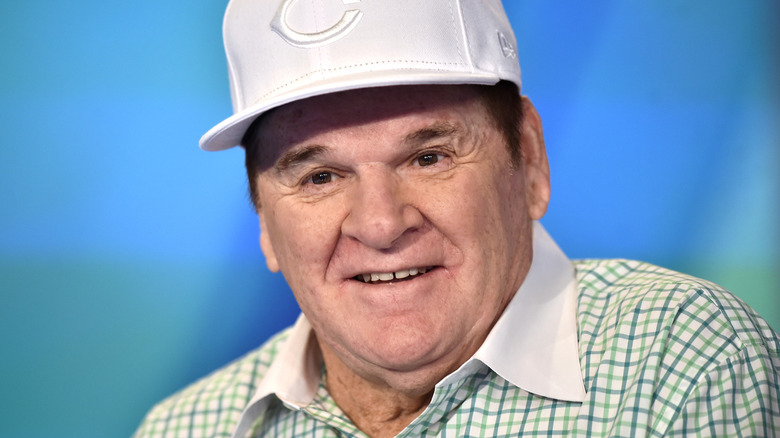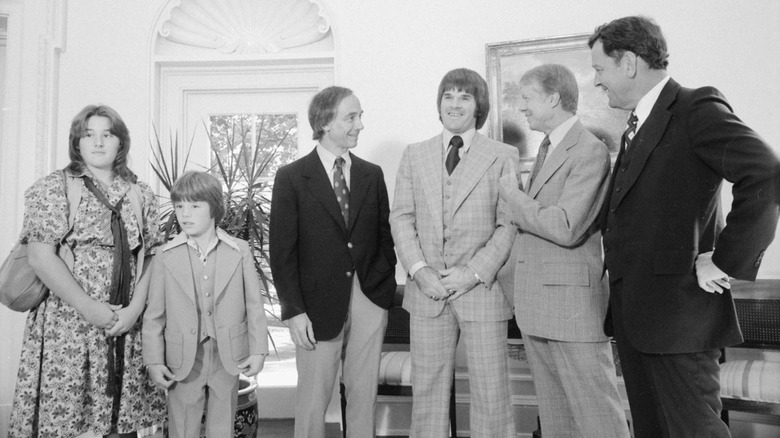Baseball Slugger Pete Rose Dead At 83
Legendary MLB slugger and charismatic player Pete Rose sadly passed away on Monday, October 29, at the age of 83. As of now, we only know that a family member discovered him in his home. According to the Clark County, Nevada medical examiner, no evidence of foul play was found at the scene, and further information will be forthcoming regarding the cause and manner of his death. He leaves behind five children.
Rose leaves behind a stellar record as one of the MLB's all-time greatest hitters. By sheer numbers, he had more hits than any other player in the entire history of professional baseball — 4,256 over 24 seasons. This is more than nigh-mythical figures like Ty Cobb (No. 2 at 4,189 hits) and Hank Aaron (a far No. 3 3 at 3,771). Most of those hits came during his time with the Cincinnati Reds from 1963 to 1978, and then again from 1985 to '86. In between, he also played for the Philadelphia Phillies and, for a brief moment, the Montreal Expos. Hence the sentiment of Cincinnati fans like Shane Vicars that remains to this day: "Pete was Cincinnati," he told The Athletic.
And of course, we'd be remiss to not mention Rose's lifetime ban from entering the Baseball Hall of Fame despite his accomplishments. He was fired from his post-player role as manager of the Reds in 1989 following accusations of betting on MLB games. These accusations (which he later admitted were true) as well as his ban from the Hall of Fame followed him till his death and often outshone his legacy as a player.
Major League Baseball's all-time No.1 hitter
In a very real way, Pete Rose's entire life was baseball. Born April 14, 1941 in the city that would go on to revere him — Cincinnati, Ohio — he played baseball as a boy under the guidance of his semiprofessional father. In 1960, Rose got drafted into the Cincinnati Reds' level D minor league team right out of high school at the age of 18 and started playing for them a whole two days later. Other players quickly took note of his skill and eagerness and gave Rose his nickname, "Charlie Hustle," for doing exactly that on field: hustling. After three years in the minors, Rose graduated to the majors in '63 and continued clobbering balls until he retired in 1986. Then, he switched to managing the Reds, the team for which he'd spent most of his career playing.
Aside from sitting on top of the MLB's all-time hits list, Rose maintained a .303 batting average over the course of his career, was a 17-time All-Star, three-time World Series winner, two-time Gold Glove winner, three-time batting champion, and had a career-high number of hits in 1973 at 230. He also won a ton of other awards over his career, including Rookie of the Year in 1963, the Reds' Ernie Lombardi MVP award five times, the Silver Bat Award three times, the Lou Gehrig Memorial Award in 1969, the Sports Illustrated Sportsman of the Year in 1975, and many more.
[Featured image by U.S. National Archives and Records Administration via Wikimedia Commons | Cropped and scaled]
Rose's betting controversy and ban from the Hall of Fame
All of Pete Rose's on-the-field accomplishments tend to get swallowed by the gambling controversy that stripped him of his job managing the Cincinnati Reds and barred him from entering the Baseball Hall of Fame. The set of events in question created a tangled legacy for Rose, one that continues to get cited and debated to this day. As the story goes, Rose accidentally left some betting slips behind in an Ohio restaurant in 1989. An investigation linked the restaurant owner, Ron Peters, and of Rose's friends, Paul Janszen, to Rose's gambling network.
As reported by The New York Times, Janszen later admitted to authorities that Rose called bets to him during games, ones that sometimes involved throwing games to work in favor of the bettors. Janszen also said that the Reds manager once lost $450,000 to wagers in 1987. Despite these claims and documented evidence attesting to Rose's gambling activities, he denied the whole thing all the way until he came clean in his 2004 memoir, "My Prison Without Bars."
Although it might be a bit early to discuss such things, some people have raised the question of posthumously admitting Rose into the Baseball Hall of Fame, citing the literalism of Rose's "lifetime" ban. At present, the Hall of Fame did tweet about Rose's death on X. "The Hall of Fame remembers Pete Rose, MLB's all-time hits and games played leader, who passed away on Monday," it wrote.


